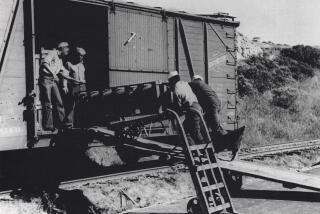Notification Process Gives Kin a Lifeline
- Share via
In notifying families of crew members on the Navy spy plane held in China, the U.S. military used a process honed over decades to handle stunned relatives of those killed, injured or lost in action.
Family members were provided with emotional and spiritual support and up-to-date information about the standoff between the U.S. and China.
“This is more than just a notification process,” Navy spokesman Lt. Bill Speaks said. “We want to be their lifeline, to assure them that they are not alone and that they’ll get their news from us, not have to wait for the media.”
For the Pentagon, one side benefit of the “casualty-call process” is that it decreases the chance that family members will blame the military for what has happened and vent that criticism to reporters.
If any families of the 24 crew members being detained on Hainan island have misgivings about their loved ones’ mission, they’re keeping that to themselves.
“I know my son is so strong. I’m proud of him,” said Josephine Mercado of Corona, the mother of Aviation Electronics Technician 2nd Class Ramon Mercado. “He loves his country, and he’s ready to die for it.”
Mark Honeck of Lakeside, the father of Lt. Patrick Honeck, told reporters, “I’m confident the Navy is doing everything possible to get the crew out.”
Darlene Edmunds of Davis, the ex-wife of Navy cryptographer Josef Edmunds, said she received a call before sunrise Sunday from U.S. military brass in Misawa, Japan. “They’re being very kind,” she said.
A common warning from the officers or senior enlisted personnel who are assigned to contact relatives in such cases is to expect media calls immediately after the names become public. Edmunds said she was told that she was free to talk but also free to say no.
Some relatives shunned the media, and others gave interviews. Edmunds said she felt that talking would help her former husband.
“I do want to personalize it so there will be public support, so the government will feel a little public pressure,” Edmunds said, though she added that she believes U.S. officials are “handling it well.”
Donna Comerford of Westchester, the grandmother of Lt. John Comerford Jr., also felt a need to communicate with the outside world. She said that if her words could reach Beijing, she is convinced that she could persuade the Chinese to let her grandson and his crew mates come home.
“I’d tell them we’re all human,” Comerford said as she sat beside a picture of her grandson in his crisp uniform. “We all feel the same. If they could feel our suffering, they’d understand.”
Navy officials expressed satisfaction Tuesday that immediate relatives were notified and that none learned of the incident from reporters.
The names of the crew members weren’t released to news organizations until Monday afternoon, 18 hours or more after many families had been contacted and allowed to decide whether to be available for interviews.
“They took very good care of their folks,” Lt. Ingrid Mueller, spokeswoman for the Navy’s Personnel Command in Millington, Tenn., said of officials at the Navy base on Whidbey Island, Wash., where the plane and crew are stationed.
The decision to release the names to the media was made by senior Navy brass at the Pentagon, in part to relieve the worry of families across the nation who feared that a relative might be among the crew members.
Concern about what relatives will tell the media has long been part of the notification process.
In fact, anger among families of those killed or wounded in the Spanish-American War led the then-War Department to order field commanders to notify relatives before making names public. In the Civil War, for example, casualty lists were given to newspapers or posted in public places.
As the U.S.-China stalemate continued Tuesday, relatives maintained individual vigils. Some attached yellow ribbons to trees, a holdover from the Iranian hostage crisis two decades ago.
“I’m a nervous wreck. I’m quivering. My knees are shaking,” said Tom Crandall of Loves Park, Ill., father of Navy Seaman Jeremy Crandall. “Are they interrogating him? Are they beating him? I’m confident they will get him out.”
Christina Mellos, aunt of Senior Chief Nicholas Mellos, an aviation machinist’s mate from Ypsilanti, Mich., said: “I’m just out of my mind right now. We’re waiting to hear more, just like everybody else.”
*
Times staff writers Eric Bailey and Noaki Schwartz and the Associated Press contributed to this report.
More to Read
Sign up for Essential California
The most important California stories and recommendations in your inbox every morning.
You may occasionally receive promotional content from the Los Angeles Times.













